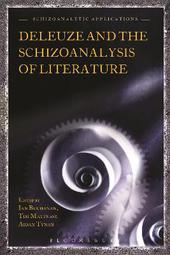
|
Deleuze and the Schizoanalysis of Literature
Hardback
Main Details
Description
In 1972, the French theorists Deleuze and Guattari unleashed their collaborative project-which they termed schizoanalysis-upon the world. Today, few disciplines in the humanities and social sciences have been left untouched by its influence. Through a series of groundbreaking applications of Deleuze and Guattari's work to a diverse range of literary contexts, from Shakespeare to science fiction, this collection demonstrates how schizoanalysis has transformed and is transforming literary scholarship. Intended for upper-level undergraduates, postgraduates and scholars with an interest in continental philosophy, literary theory and critical and cultural theory, Deleuze and the Schizoanalysis of Literature is a cutting edge volume, featuring some of the most original voices in the field, setting the agenda for future research.
Author Biography
Ian Buchanan is Director of the Institute for Social Transformation Research, Faculty of Arts, University of Wollongong, Australia. He is the author of Deleuzism (2000) and the editor of Deleuze Studies. Tim Matts was formerly Research Associate with the Department of Decay at the Bartlett School of Architecture, University College London, UK. Aidan Tynan teaches English literature and critical and cultural theory at Cardiff University, UK. He is the author of Deleuze's Literary Clinic: Criticism and the Politics of Symptoms.
|